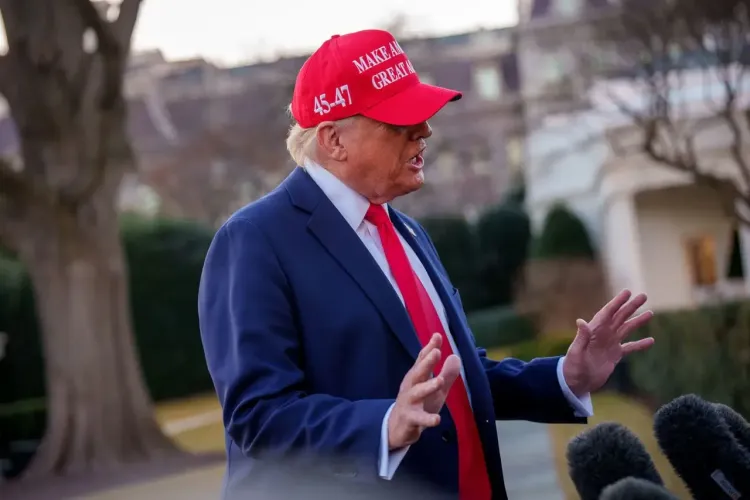Trump Initiates Probe into National Security Concerns of Lumber Imports

Synopsis
Key Takeaways
- Trump has ordered a national security investigation into lumber imports.
- The probe targets timber and derivative products, including kitchen cabinets.
- The investigation is conducted under Section 232 of the Trade Expansion Act.
- Domestic timber production is prioritized to reduce housing costs.
- The Pentagon is a key consumer of lumber products.
Washington, March 2 (NationPress) US President Donald Trump has issued an executive order to initiate an investigation regarding the effects of lumber and timber imports on America's national security, a step that may lead to the implementation of new tariffs.
Trump has instructed Commerce Secretary Howard Lutnick to commence the investigation, highlighting that the United States is facing significant vulnerabilities in its wood supply chain due to imported timber, lumber, and their derivative products being dumped into the U.S. market.
A White House official indicated that South Korea and China will be included in the investigation, which will also encompass derivative products such as kitchen cabinets. This investigation will proceed under Section 232 of the Trade Expansion Act of 1962, which empowers the president to impose import restrictions if such imports are deemed a threat to national security, as reported by Yonhap news agency.
On the same day, Trump also signed an executive order aimed at boosting domestic timber production and alleviating construction and housing costs in the U.S. It is important to note that timber refers to unprocessed trees or tree parts, while lumber refers to processed wood.
According to the official, "Our failed timber and lumber policies, a remnant of the previous administration, contribute to wildfires and harm our fish and wildlife habitats."
"They increase construction and housing expenses, and impoverish America through substantial trade deficits resulting from exporters like Canada, Germany, and Brazil dumping lumber into our markets, jeopardizing both our economic well-being and national security," the official explained.
The official emphasized that the administration is also focusing on the implications of derivative products.
"For instance, we are exporting our logs only to see them return from China, and South Korea is heavily subsidizing products like kitchen cabinets and similar items," he stated.
When questioned about why lumber imports represent a risk to national security, the official noted that the Pentagon is a significant consumer of lumber and derivative products.
"The reliability of our supply is crucial. While we may not be constructing aircraft with it, we are certainly building all the ancillary structures required by the military," he asserted.
"It is fundamentally dangerous for this country to become increasingly reliant on a foreign supply chain for a product with which we could achieve self-sufficiency."
Last month, Trump mentioned he was considering a 25 percent tariff on lumber and wood products.
According to the Korea International Trade Association, South Korea's furniture exports to the U.S. amounted to $30 million last year. Some analysts suggest that U.S. tariffs on timber imports, if enforced, may have a limited effect on Asia's fourth-largest economy.
This latest action follows Trump's signing of an executive order on Tuesday to investigate how copper imports threaten America's national security and economic stability, which could also lead to new tariffs on the metal essential for manufacturing aircraft, vehicles, ships, and other military hardware.









